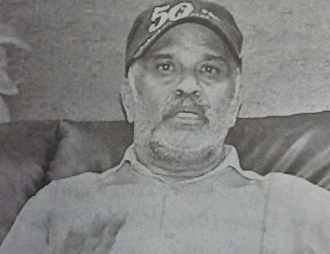Kasaragod, Jan 10: Nearly four decades after he left Kasaragod and landed in Gulf, he could not return home till last week. 54-year-old Alambadu Balakrishnan who spent 38 years in Bahrain as an undocumented migrant worker returned home last Saturday under a six-month public amnesty for undocumented workers in Bahrain that ended on December 31, 2015.
 Balakrishnan, who has been doing mundane jobs, did not go home even once as he was stuck without a passport and suffered from depression following the death of his mother and brother in the past.
Balakrishnan, who has been doing mundane jobs, did not go home even once as he was stuck without a passport and suffered from depression following the death of his mother and brother in the past.
Alambadu Balakrishnan, who hails from Kanjangadu, Madikkai in Kasargod, Kerala, was brought to Bahrain by his elder brother Kannan, who later fell sick due to cancer and returned home for treatment. His younger brother Kelu, too was in Bahrain, but he lost his job, leaving the responsibility of repatriating him to Balakrishnan.
“He used to send money to his mother till her death three years ago. When his friends visited Kerala, he used to send blankets and other gifts for his mother. He spoke for about one hour when his mother died and after three hours, he got another phone call informing about the death of his elder brother,” a Malayalam language has reported.
Balakrishnan’s ambition on returning home is to build a house and if anyone is ready to be his life partner at this age, he wishes to get married.
Over 42,000 expatriate workers in Bahrain benefited from the six-month general amnesty for workers staying in Bahrain illegally, the CEO of the Labour Market Regulatory Authority Ausamah Abdullah Al Absi has said. Bangladeshis, Indians and Pakistanis were the most beneficiaries of the amnesty.





Comments
we should blame our country for this injustice act,
lucky man finally get to his country
we should be thankful to saudi govt.
Add new comment